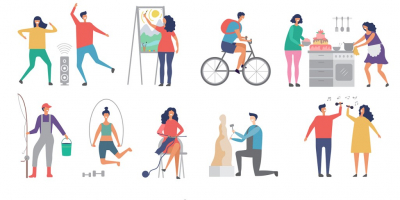Top 9 Answers to ‘What Is Your Communication Style’ Interview Question
There are many various communication styles, and each one offers advantages over the others. In order to identify the best fit for their firm, interviewers use ... read more...the "What is your communication style?" question to better understand each candidate's unique communication style. This article is about top Answers to ‘What Is Your Communication Style’ Interview Question.
-
Any company can greatly benefit from employees with effective communication skills. But, many of find it difficult for a variety of reasons, causes problems at both the individual and organizational levels. Perhaps there will indeed be a day when robots and artificial intelligence take our place. The necessity for human communication will disappear. Then, perhaps, people will also develop into robots. But until then, you'll have to deal with interviewers who will ask you about communication.
This response serves as a good all-purpose response to any inquiry that specifically inquires about your preferred method of communication. This illustration not only answers the question, but it also illustrates your adaptable style, which enables you to get along with people regardless of their communication preferences.
Example:
I've mastered a variety of communication methods in order to be more effective because everyone has a particular communication style that they connect with. The ideal approach, in my opinion, is to mimic the other person's preferred communication style while using the mirroring technique.
Although I personally favor direct communication, I make an effort to be patient and utilize active listening techniques in order to fully grasp the viewpoint of the other party before expressing my own. Using this strategy, I've been able to communicate clearly.
Image by Headway via unsplash.com 
Image by fauxels via pexels.com -
De-escalation is a crucial ability for everyone to possess in modern society. The ability to de-escalate might be the difference between a calm conclusion and a deadly escalation, whether you're a customer service professional handling an unhappy caller or a security officer defusing a difficult scenario.
You should prepare for de-escalation-related interview questions if you're looking for a job that requires interaction with the public or handling potentially explosive circumstances. This response emphasizes the value of being able to listen and naturally adjust your tone to the audience. Also, it demonstrates that you are aware that de-escalation does not necessarily include carrying out the customer's wishes.
Example:
I always put other people's needs first when trying to resolve a problem. I put my attention on listening intently to discern the customer's actual sentiments. I am conscious of my body language and facial emotions as I do that to let them know that I am truly paying attention.
Since I communicate intuitively, the personality type I am interacting with will determine whether I adopt a passive or an assertive communication approach. I make sure they feel heard by using active listening while we talk about their alternatives for dealing with the problem. This is a successful communication strategy, in my experience, to deescalate most people from the point of conflict—even when I am unable to satisfy their complaint.
Image by fauxels via pexels.com 
Image by fauxels via pexels.com -
Finding a solid example and organizing your response are equally crucial. You should format your response so that it highlights your knowledge and abilities. Keep in mind that the recruiting manager wants information when you are composing your response. Think about a complex situation or problem that you can make it simple and understandable to people unfamiliar with the technical jargon used by your organization or industry.
This is a wonderful response since it clarifies how to make information understandable. Also, it demonstrates your meticulous nature and desire for everything to be understood without any need for clarification. This is one of the top Answers to ‘What Is Your Communication Style’ Interview Question.
Example:
I once had to walk my manager through a new system because he had to present. As an analytical communicator, I could quickly recognize the crucial details to highlight for my manager. I divided the subject into manageable chunks and provided analogies to clarify each one. I asked them to repeat what they had just said after each section. Finally, I requested that they provide me an explanation of the entire system in their own words. This ensured that they fully comprehended everything.

Image by fauxels via pexels.com 
Image by fauxels via pexels.com -
In the business, it's sometimes implied that a lengthy meeting could have been replaced by a speedier, more effective email. Yes, there are meetings that could have been conducted by email, but there are other circumstances when this may not be appropriate. All forms of communication must be taken into account and valued if an employer cares about creating an inclusive and productive workplace that keeps its employees.
This response is appropriate since it demonstrates your ability to employ many forms of communication while appreciating their benefits. It demonstrates that you have good communication skills and are a communicative person.
Example:
I naturally communicate effectively, so I concentrate on what gets the point through. One of my most valuable traits in terms of communication preferences is versatility. While I value written communication for its accuracy and traceability, I value vocal communication for its quickness, effectiveness, and directness.
I often strive to strike a balance. By this, I mean that I have a verbal exchange and then send a note or email mentioning it. Also, it's one of the finest covert strategies for encouraging team members to communicate better and holding tough coworkers accountable.
Image by Marcus Aurelius via pexels.com 
Image by fauxels via pexels.com -
Your response demonstrates a grasp that both talking and listening have their advantages and that effective communication calls for both. Both abilities are critical, but it seems that in this job, listening to others' perspectives is more crucial. You can help the person who is speaking by choosing to listen rather than to speak. Particularly if you are truly listening to what they are saying and aren't thinking about anything else. The speaker will value you, and you will have developed a relationship. It can be seen as one of the top Answers to ‘What Is Your Communication Style’ Interview Question.
Example:
Both are critical, but if I had to pick one, I would say that listening well is more crucial. Good listeners must resist becoming unresponsive. Although they frequently grasp the big picture, passive communicators frequently omit to communicate crucial insights.Those who talk excessively, on the other hand, frequently speak at the expense of others and tend to be aggressive communicators who prioritize their own demands. Talking and listening in moderation is necessary for establishing deep connections and positive relationships at work.

Image by fauxels via pexels.com 
Image by fauxels via pexels.com -
Several different talents must be displayed during presentations. When asked about your presentation skills, it's critical to demonstrate that you are aware of each essential talent that is needed. Instead of droning on about the presentation's substance and the audience's response, you need to demonstrate to the employer that you are a skilled presenter.
Example:
A presentation request was once made of me at work. I was worried that the audience would become bored because the subject and content were dry. I used excellent visual aids that employed color effectively while remaining unobtrusive in order to be effective. I didn't shout or rush, but I did speak with enthusiasm and enthusiasm for the subject.
I started out by describing to the audience why and how the topic was beneficial to them as well as the advantages they would experience. I also presented my ideas in a question-and-answer format. I piqued the audience's curiosity about the subject by starting by posing intriguing questions, which activated their innate desire to seek solutions. According to the feedback, everyone was attentive and benefited greatly from my talk.

Image by Jason Goodman via unsplash.com 
Image by Austin Distel via unsplash.com -
You've gotten good at offering helpful criticism, but what about receiving criticism rather than providing it? It can be quite challenging to accept constructive criticism without becoming defensive. Even though you understand that someone is providing comments to assist you, it's natural to feel a little defensive when getting criticism—regardless of how useful it may be.
This response is open to suggestions for improvement and welcomes them in a credible and responsible manner. Also, it demonstrates your bravery and ability to maintain composure under pressure from others in challenging circumstances. The organization requires these individuals to prevent frequent arguments and disagreements during teamwork.
Example:
Even though I don't like it, I appreciate and actively seek out constructive criticism since it pushes me to improve. While I have a strong sense of self and am aware that every mistake is real, it rarely affects how I conduct myself professionally. When I am corrected, I make an effort to fully comprehend what went wrong in order to steer clear of making the same error again. I also consider what new abilities I can pick up and look for instruments for self-evaluation that I can use to track my advancement.

Image by Christina Morillo via pexels.com 
Image by Kindel Media via pexels.com -
This question may have been asked of you for a variety of reasons throughout the interview. They might be curious about your capacity for persuasion in previous jobs. They can assess the magnitude of a potential effect from you using this.
Your approach to answering this question will reveal a lot about you. You shouldn't be arrogant and demonstrate how you are always prepared to persuade everybody and everyone as you will be working under someone. But, there are instances when convincing others to work in a certain direction becomes more important, and as an authorized employee, you should have your own persuasive techniques.
When talking about persuasion, it is always a good idea to sound persuasive rather than manipulative. Instead, describe how you can make the other person want to take your desired action without causing a fight.
Example:
At a prior position, my manager and I had a disagreement over how to resolve a project issue. I was able to be direct and discuss the facts since we were both direct communicators. I said that because I had career goals and because success was important to me, I had done extensive research on possible solutions. I used my strategy to offer cases from the same industry.I also mentioned how, even though my proposal would require less of their time and effort, they would still be eligible to receive the performance bonuses associated with a project's success. I got them to use my strategy by not criticizing their solution and by demonstrating how they might profit from it.

Image by fauxels via pexels.com 
Image by fauxels via pexels.com -
Developing conflict management skills can boost productivity and improve the quality of your workday. Regardless of your positions within the company, effective communication with your coworkers can directly affect your ability to succeed at work. The ability to resolve conflicts is valuable, but it takes time and effort. This response demonstrates the capacity to resolve conflicts amicably and put the needs of the firm first. This respond can also be seen as one of the top Answers to ‘What Is Your Communication Style’ Interview Question.
Example:
When a coworker and I had a heated argument at one of my previous employment, they would only speak to me in a passive-aggressive manner, which had a significant negative effect on the team. I decided to contact them about our issue in a subservient manner rather than argue with them.
We had a disagreement, and I apologized and said I wanted to prioritize the business and my customers. We talked openly and worked together to find a solution to the problem so that things didn't go too far and we are still good colleagues. I asked them how I could work and communicate with them in the future in fair ways. We were able to resolve our issue because I was able to approach them without setting off their defenses by owning the discord.
Image by fauxels via pexels.com 
Image by fauxels via pexels.com






























